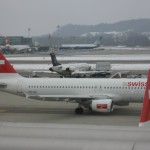Airlines, want better GDS model? Unite!
One by one, airlines are waking up to the sobering reality of the modern Global Distribution System (GDS) model, which they created decades ago. Two carriers have now taken legal action, and this is only the beginning. If more airlines want to see changes and lower costs, they should join forces instead of watching from the sidelines.
Judge Miriam Goldman Cedarbaum of the United States District Court for the Southern District of New York is about to become an expert on airline data distribution — in the 82nd year of her life. You can see her name stamped on a complaint (pictured above) filed last week by US Airways against Sabre, the largest GDS in the United States…





